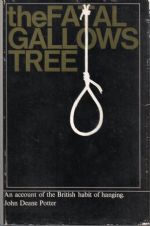THE FATAL GALLOWS TREE An Account of the British habit of hanging
Author: Potter (John Deane)
Year: 1965
Publisher: Elek
First Edition
Edition Details: 1st edn.
Book Condition: Vg+/Vg+
Price: £15.00
IN STOCK NOW
Hardback. 'On 13th August 1964 Gwynne Owen Evans and Peter Anthony Allen were hanged. And so ended an English custom which, in recent years, has caused intense public controversy and strong feelings in and out of Parliament. From the earliest records after the Norman invasion, when 'gallows rights' were the prerogative of the Church and the Lords of the Manor, hanging has run like a dark thread through English history. Now that the thread has finally broken, John Deane Potter examines the gruesome facts, the circumstances surrounding executions and the changing national attitudes towards capital punishment. From the mid-twelfth century, when hanging first became the sole right of the king, until 1869 all hangings were public. Often they were boozy almost jolly affairs, with hangman, victim and crowd roaring drunk. And the reason for abandoning public execution was no humanitarian one, but the danger to public safety through uncontrollable spectators. In the 18th century there were 222 offences punishable by hanging; in 1801 Andrew Benning aged 13 years, was executed for housebreaking; in 1818 the Governor of Northampton County Jail proudly described his new drop scaffold as 'efficient for hanging twelve persons comfortably'. All this may have happened in 'rougher' ages but the record of our own century is not so different. Mr. Potter reveals that in the first half of the twentieth century, over 1000 death sentences were passed and 600 people executed.....' Illus., Bibliog. 196pp. 8vo. h/back. Lightly browned edges and eps, covers Vg+ in Vg+ dw showing signs of a little shelf-wear.
Titles Recently Added To The Catalogue
Wants list
If you're after a particular title, enter your details below
Selling a Book?
Enter the details below and we'll be in touch shortly


